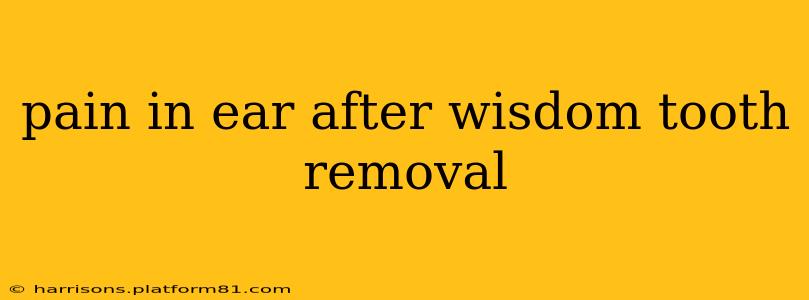Experiencing ear pain after wisdom tooth removal is more common than you might think. While seemingly unrelated, your ears and jaw are closely connected anatomically, making it entirely possible for oral surgery to trigger earaches. This comprehensive guide will explore the reasons behind this discomfort, discuss potential solutions, and answer common questions surrounding ear pain following wisdom tooth extraction.
Why Does My Ear Hurt After Wisdom Tooth Removal?
The connection between your jaw and ear stems from the intricate network of nerves and tissues in your head and neck. The trigeminal nerve, a major cranial nerve, innervates both your jaw and parts of your ear. Inflammation, swelling, or irritation in the jaw area after wisdom tooth extraction can easily radiate pain along this nerve pathway, causing you to perceive the pain as originating in your ear.
What are the causes of ear pain post wisdom tooth extraction?
-
Referred Pain: This is the most common cause. Pain originating from one area (the jaw) is felt in another area (the ear) due to the shared nerve pathways. The intense inflammation and swelling following the procedure often trigger this referred pain.
-
Sinus Infection: The proximity of your wisdom teeth to your sinuses means that the extraction process can sometimes disrupt or irritate the sinuses. This can lead to a sinus infection, which manifests as ear pain, along with other symptoms like facial pressure and congestion.
-
Dry Socket: Although primarily characterized by jaw pain, a dry socket (alveolar osteitis) can also contribute to radiating ear pain due to the severity of the underlying inflammation and infection.
-
Infection: A post-operative infection at the extraction site can spread, potentially causing ear pain. This is less common with proper post-operative care.
How Long Does Ear Pain After Wisdom Tooth Removal Last?
The duration of ear pain varies greatly among individuals. For many, it subsides within a few days as the swelling and inflammation decrease. However, some may experience ear pain for a week or even longer. If the pain persists beyond a week, or worsens, it's crucial to consult your dentist or oral surgeon immediately.
Is Ear Pain After Wisdom Tooth Removal Normal?
While ear pain is a common experience following wisdom tooth extraction, it isn't necessarily "normal" in the sense that it should be expected. It's a symptom related to the healing process, but the intensity and duration can vary significantly. Mild to moderate ear pain is usually considered within the normal range of post-operative discomfort, but persistent or severe pain warrants a checkup.
What Can I Do to Relieve Ear Pain After Wisdom Tooth Removal?
Several methods can provide relief from ear pain after a wisdom tooth extraction:
-
Over-the-counter pain relievers: Ibuprofen or acetaminophen can help manage the pain. Always follow the recommended dosage instructions.
-
Ice packs: Applying ice packs to the affected area can help reduce swelling and alleviate pain.
-
Rest: Adequate rest allows your body to focus on healing.
-
Gentle rinsing: Rinse your mouth gently with salt water to keep the area clean and prevent infection. (Your dentist will give specific instructions.)
-
Elevate your head: Sleeping with your head elevated can reduce swelling and pressure.
-
Avoid strenuous activity: Physical activity can increase blood flow and inflammation, potentially worsening the pain.
When Should I See a Doctor or Dentist?
Seek immediate medical attention if you experience:
- Severe or persistent ear pain: Pain that doesn't respond to over-the-counter pain relievers or lasts longer than a week.
- High fever: This could indicate an infection.
- Increased swelling: Significant swelling beyond the initial post-operative swelling.
- Pus or discharge from the extraction site: This signifies a potential infection.
- Difficulty swallowing or breathing: This is a serious sign and requires urgent medical attention.
Conclusion
Ear pain after wisdom tooth removal is a relatively common complication stemming from the close anatomical relationship between the jaw and ear. Understanding the causes, managing the pain with home remedies, and knowing when to seek professional help can make a significant difference in your post-operative recovery. Remember, always follow your dentist's or oral surgeon's post-operative instructions carefully. Early intervention can often prevent minor discomfort from escalating into more serious complications.
